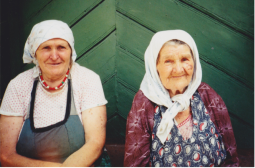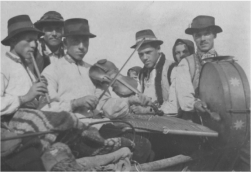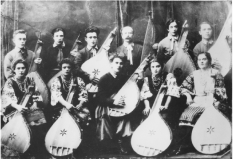Dudnyk Domna Fedorivna, b. 1923
—At what age were the children taught to work? For instance, if the father was rich, until what age could his children not work?
Domna Fedorivna: A rich father would not send his children to work. They had to be home. Only members of poor families who had nothing to eat and nowhere to go had to work. I had to start working because I had no choice; I had to buy some clothes.
—Was there a division of labor between men and women?
Domna Fedorivna: At the time, you did what you had to do. Any job you could get. This is how life and work went.
………………………………………………………………………………………..
-Did your father apply to join the kolhosp?
Domna Fedoriva: He did and nearly joined along with Bomko and Martyn. The condition was, once you joined the kolhosp, to go from house to house and evict people from their homes. My father said, “I can’t do this.” This provoked anger against him and for this he was evicted and dispossessed. They didn’t leave him anything, not a gram.
—What category were your parents?
Domna Fedorivna: They weren’t rich; they were the so-called seredniaky. They were in the middle and a bit more resourceful. I remember we had a thresher; four or five people would use it together.
—Did they have a home in the village?
Domna Fedorivna: Yes. Now they say that those who could afford to own a farmstead were arrested, and those who were good for nothing even now own nothing. But back then, such were the times. I cannot say exactly what we owned: we had a cow, horses, pigs, barns all around. We didn’t have any bulls. All of this was gone; they left us nothing. We had a new house that was not yet plastered, so they took it apart and only left the floor out of the whole house. They took it apart to the ground, only leaving half of it. They evicted the Partyh family (Lida is the one who survived); they moved them to our house. They did this all out of spite.
………………………………………………………………………………………..
—Was this done by newcomers?
Domna Fedorivna: No, locals. The father of this Mykhailo Y was the leader. These were the first communists [in that locale].
—Do you think it was on their own initiative or they were forced?
Domna Fedorivna: We didn’t see any newcomers. Maybe they got some directives from somewhere, but locals executed it all.
………………………………………………………………………………………..
—Was this done by the newcomers?
Domna Fedorivna: No, locals. The father of this Mykhailo Yakovlevich was the leader. These were the first communists.
—Do you think it was their own initiative or they were forced?
Domna Fedorivna: We didn’t see any newcomers; maybe they got some directives from somewhere, but locals executed it all.
………………………………………………………………………………………..
—How did people who didn’t join the kolhosp make a living?
Domna Fedorivna: They suffered because their land would be constantly taken away; they did what they could until the second kolhosp was built later on. One was named after Stalin, and the other one after [Ukrainian Communist Party leader] Petrovsky. So those who didn’t join the first one, were herded together into the second one; they saw that there was no choice. They didn’t pay money at the time. They gave a kilogram or two or three [of grain?] per day. At the end of the year, they would calculate kopeks, deducting fifteen or eighteen or twenty kopeks. At the very end of the year, you’d know if you earned a ruble or so. And when the last year was closed, you had to do what you could if you needed money.
………………………………………………………………………………………..
—Did people steal from the kolhosp at the time?
Domna Fedorivna: Not as much as they do now, no. If they went to harvest peas, they could take a little home to make a soup or a pie; that was all. People were afraid. Later on, during the Romanian occupation during the war, it got worse. Truth be told, they gave people good bread, but there was no money. By then, I had worked in the kolhosp for two years with my mother, and those people gave me skirts and jackets because I grew out of the clothes I had. I left the sugar beets field and saw that people were changing shifts. I said I would do two or three shifts back-to-back because I had no one else who could earn anything; I had to earn more.
………………………………………………………………………………………..
—When your brothers grazed the cows, how were they paid for their work?
Domna Fedorivna: Money was tight at the time, so people worked for thirty-two kilograms of grain that would last until the fall. And in the kolhosp, you got whatever you earned. At the time, my mother took me back from naimy (hired out). I was twelve. She would take a portion of beets for herself, and half a portion for me; we were working in the kolhosp. You know, in those years it was so difficult to work, but what can you do.
………………………………………………………………………………………..
—When you were young, what kind of music did people play?
Domna Fedorivna: The music was interesting; there were the wind instruments.
—Were there muzykanty from your village?
Domna Fedorivna: Yes, they were all from the village. People would hire the musicians for the New Year. It was a custom for the guys to pay the musicians and invite a girl. If a girl was not invited, she could not go on her own. This was the a hard-and-fast rule. Even though I was poor, I had a suitor—Hryhorii Antonovych.
…………………………………………………………………………..
The musicians in our village were great. When I was getting married, I said, “Even if I marry a widower, I’d like our muzykanty to play an hour of my favorite music.”
—Where did you hire the muzykanty for your wedding?
Domna Fedorivna: They were from Kalytynka.
—How many of them?
Domna Fedorivna: Seven or eight. They played so well.
—What melodies did they play?
Domna Fedorivna: Polka, bushanka, krakowiak, korobochka, “na rechenku”—these were all dances.




